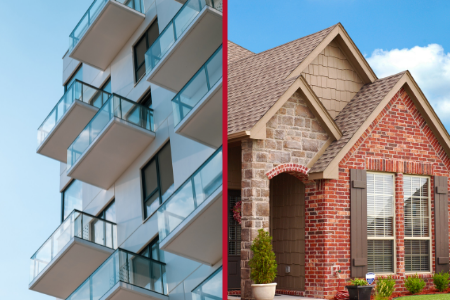(Published on - 9/17/2021 2:00:15 PM)

Buying your first home is an exciting time. You’ve decided to step out of the comfort of renting or staying somewhere rent-free and step into a place you can truly call your own. But if you’re not interested in a large space, is owning a condo the same thing as owning a house?
Both options have their benefits and drawbacks, but it ultimately comes down to what you value in a home. You must choose which option fits you correctly, or you might find yourself thinking the grass is greener on your neighbor’s lawn.
We’ll walk you through the process and differences of buying a condo vs. buying a house.
What It’s Like to Buy a Condo
A condo, short for condominium, is more like an apartment than a single-family house. It requires less upkeep than a house but also has a greater lack of privacy. In many cases, it’s a more affordable option and makes for a great starter home.
Pros of Buying a Condo
For starters, if you can’t comfortably afford a single-family home, using a condo as your starting point might pique your interest. Condos are, on average, about $45,000 less than traditional single-family homes.
You’re also not alone when it comes to maintenance. While you might have to pay for anything that acts up within your own home, you don’t have to worry about outdoor maintenance. The homeowner’s association will likely pick up the costs for maintenance like cleaning gutters, shoveling snow, and dealing with HVAC problems. This also includes negotiating with construction professionals and handling contracts that may befuddle an individual homeowner.
Additionally, you may find condos in more desirable locations and neighborhoods. Since condos are typically dense construction projects, condos can be near stores, restaurants, or other places of interest. When living in a condo, you will also find that your insurance may be cheaper than standard homeowner’s insurance. With less ground to cover, you’ll be paying less of a premium.
Cons of Buying a Condo
Unfortunately, what you save in fees may pour straight into what you pay in HOA dues. Homeowner’s associations manage building upkeep, policies, and mediation for condo owners. They can also cover some utilities like water and sewer. If you can handle that recurring payment, you’ll likely still save in other places.
HOAs can sometimes be a source of conflict. This is because you may encounter more rules, like what you would find in an apartment complex. For example, you may not be permitted to make certain changes to your property or need to abide by pet restrictions. You’ll generally have less autonomy than in a single-family home.
Last, condos can be harder to sell than single-family homes, so consider the resale value if you’re planning to stay in your condo for the short term. Depending on your location, condos may appreciate more slowly. They can spend longer time on the market and sell for less than houses, though that margin is decreasing.
What It’s Like to Buy a House
Buying a house may well be most of the population’s dream. While some think that buying a home isn’t in the cards for them and instead opt for condos or apartments, it’s possible to have a house for near the same price as a condo if you’re prepared for the financial steps you’ll need to take.
You must make sure you can keep up with payments while being fully prepared for all the benefits and difficulties of owning a house. Here are the ins and outs of homeownership.
Pros of Buying a House
Houses are easier to sell in the future. If you plan on moving at any point, you can rest assured that it’ll be easier for you to find a buyer for your house than for a condo. The ease of selling may be in part due to the value of the land. Land appreciates over time because it is in limited quantity — humans can’t just make more of it.
Another major boon to owning a house is that you have fewer rules to follow. Within reason, you can do what you want with the house and be less concerned about noise. You can make adjustments as needed, whether by adding a deck or painting walls (check your city or town rules for building restrictions). You have the flexibility to change things up. Plus, you will likely have a yard that children and animals can play in, which may be ideal for some households.
Cons of Buying a House
Unless your house is in an active and well-funded community, you may not have access to the amenities you want, such as a modern gym or private pool- unless you create your own. You may also find you have to pay more in closing costs for the larger home, which can make the initial purchase more challenging for first-time buyers.
Since it’s your house, inside and out, you will have to keep up with the maintenance yourself. This isn’t a problem for many savvy homeowners that can DIY. However, it can prove stressful in an emergency or for a household that isn’t confident in evaluating and hiring contractors.
Last, there may be less sense of community. Unfortunately, when living in a house, you often need to go out of your way to meet your neighbors, who may be fond of their privacy. Humans thrive on social interaction, which can boost your spirits and help you live a longer life. If you choose to live in a private home, be sure to reach out to your neighbors to introduce yourself.
Is It Better to Buy a Condo or a House?
Only you can answer the question of which type of home is right for you. Condos offer quite a bit for less money, but houses give you a sense of independence while allowing you the privacy and land you want. If you have young children or active dogs, moving into a house might give them more room to frolic and play. If you live alone or with just a partner, you may choose to cut back on spending and maintenance and stay in a condo.
Whatever you choose, make sure you’re making the best decision for yourself and your family, no matter what size it is.
About the Author: Evelyn Long is the editor-in-chief of Renovated, an online resource for the real estate market. Her freelance writing has been published by the National Association of REALTORS®, Insights for Professionals and other prominent industry magazines.























